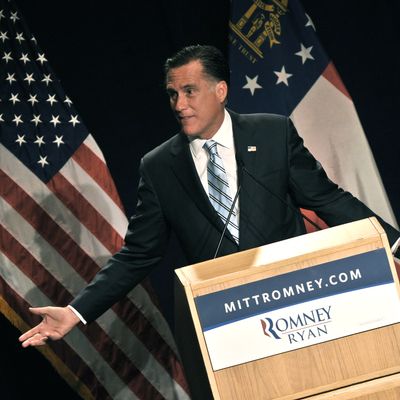
Mitt Romney’s campaign has been notable for its reliance on President Obama’s gaffes. It built its entire convention theme around Obama’s slightly disjointed disquisition about infrastructure (“You didn’t build that”) and has, at other points, seized gleefully on such lines as “the private sector is doing fine” and “our plan worked,” and Joe Biden’s “chains” metaphor, among others. Yesterday, two gaffe-exploitation attempts collided somewhat awkwardly, when Romney had to interrupt his message about Obama’s 1998 gaffe endorsing neoliberal redistribution to seize upon a fresh new gaffe in which Obama said change has to come from outside Washington. Has a presidential campaign been more reliant upon seizing on its opponent’s words (and wrenching them out of context)? This appears to be the hallmark of the Romney 2012 campaign method.
Obama has not totally disavowed the gaffe-exploitation approach to campaign messaging. He is currently hitting Romney’s secretly recorded video in which, speaking to donors, he waxes Montgomery Burns over the layabouts, goldbrickers, and slug-a-beds who make up nearly half of America. For the most part, though, Obama has left it to the media to chase various Romney gaffes. Earlier this summer, reporters chased Romney to a plane in Poland, with one shouting, “What about your gaffes?”
The line has reverberated, justifiably, as a low point for the media. I think it could be taken back by Romney and refurbished as a new campaign slogan. That is his message: “What about your gaffes, Mr. President?” Every day Romney could recite the list. He could prod reporters to ask more — what gaffes is Obama uttering behind closed doors and not sharing with America? He could get his own placard (“The gaffes stop here”). If he wins, he could run for reelection under the slogan “He kept us out of gaffes.”
It is ironic that Romney has devoted far more of his message to gaffe exploitation when most observers would regard him as the more gaffe-prone of the two candidates, by a wide measure. (Granted, including running mates would drop Romney to a distant second.) But what Romney’s method shows is that the definition of a gaffe is elastic.
There is a rich literature of punditry attempting to define a gaffe, but in practical terms, it is most clearly defined as anything a politician wishes he hadn’t said. But what makes him wish that depends on the context. If a candidate says something utterly outrageous but nobody cares, it is not a gaffe. Alternatively, a completely anodyne statement can be turned into a gaffe. If you recall, in 2008, John McCain said, “If we keep talking about the economy, we’re going to lose.” Obama exploited the gaffe, repeating it in the stump and in campaign ads. Then, last year, Romney turned it into an Obama gaffe, by quoting Obama quoting McCain and making it seem as though he were expressing his own views. This, of course, opens up the possibility that if Romney wins, his 2016 opponent will campaign against him by running ads of Romney running against Obama’s gaffes.






























